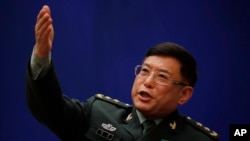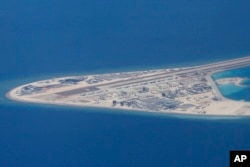China needs to build defensive structures on islands in the South China Sea to display its claim to sovereignty over virtually the entire crucial waterway, a leading Chinese general said Thursday.
However, the vice president of China's Academy of Military Sciences, Lt. Gen. He Lei, declined to comment on aircraft deployments on artificial islands Chinese has built in the area, saying those were entirely China's domestic affair.
“I don't think any country would want to make irresponsible comments about such matters,” He said in a rare meeting with Chinese and foreign journalists on the sidelines of the annual session of China's ceremonial legislature, of which he is a member.
Earlier Thursday, Foreign Minister Wang Yi appeared to blame the U.S. and its allies for stirring up trouble in the South China Sea, which is claimed in all or in part by China and five other governments. He said China had been working with other claimants and its Southeast Asian neighbors on completing a code of conduct to prevent frictions in the waterway that has rich fishing grounds, vital sea routes and a potential wealth of undersea natural resources.
“Some outside forces are not happy with the prevailing calm, and try to stir up trouble and muddy the waters. Their frequent show of force with fully armed aircraft and naval vessels is the most destabilizing factor in the region,” Wang said.
The U.S. doesn't take a stance on the sovereignty claims but insists on freedom of navigation in the area and has sailed close to Chinese-held islands to challenge Beijing's sovereignty claim.
In other remarks, He defended China's 8.1 percent increase in its defense budget announced Monday, which brings it to a record 1.1 trillion yuan ($173 billion), the world's second largest.
While China is preparing to launch its second aircraft carrier, integrate stealth fighters into its air force and field an array of advanced missiles able to attack air and sea targets at vast distances, He said the military's overall cost to the nation is relatively light.
China this year is spending 1.25 percent of its GDP and 5.2 percent of the total government budget on the armed forces, considerably lower than the U.S. and Russia, He said.
“So really, an increase of 8.1 percent is still pretty low,” He said.





